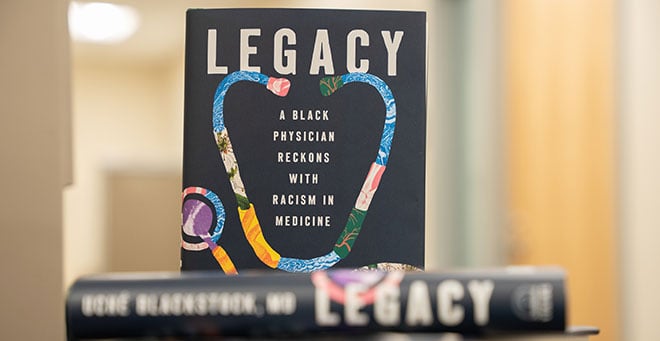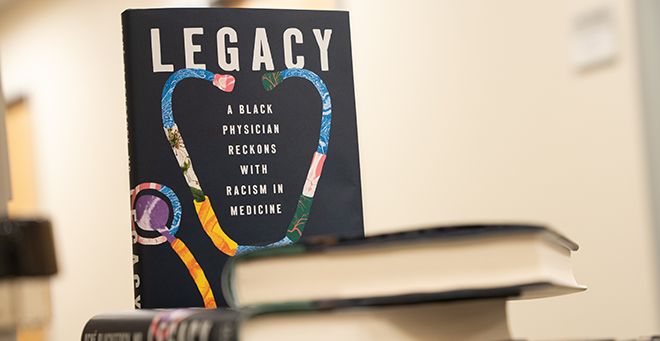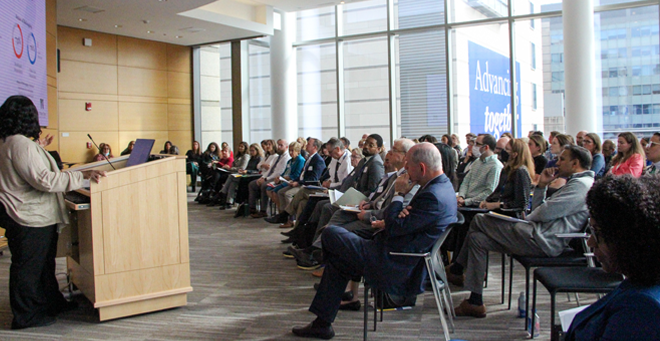
Uché Blackstock, MD, joined the UMass Chan Medical School community for a virtual talk about her book Legacy: A Black Physician Reckons with Racism in Medicine, the 2024 Diversity Campus Read. The event was facilitated by Uchechi Nna, a student in the T.H. Chan School of Medicine, on Feb. 28.
The book’s title carries with it multiple meanings. When Dr. Blackstock and her twin sister Oni followed in their mother Dale’s footsteps and graduated from Harvard Medical School in 2005, they became the first Black mother–daughter legacies from the school. But the book is also about the legacy of racism as it pertains to health care.
“The Black–white infant mortality gap is worse today than it was 15 years before the end of slavery,” Blackstock said during the discussion. “Today, Black infants are more than twice as likely to die in their first year of life as white infants. And this is despite advances, innovation, technology and research. And so I really wanted to connect the dots for readers, and also for a broad audience, as to why, in 2024, we’re still seeing the statistics that we’re seeing today.”
“I would love for us to be in environments where we can thrive and not just survive.”
In her book, Blackstock weaves national, historical statistics into a personal narrative about her physician mother and her own experiences with patients who assumed, because she was Black, that she was not the supervising physician. She wonders if systemic racism contributed to her mother’s death from leukemia at 47, noting that there are two radioactive dumping grounds in Black and Latinx communities in Brooklyn, where her mother lived. Blackstock discussed in the book and the UMass Chan Q&A a phenomenon public health researcher Arline Geronimus, ScD, calls weathering.
“Studies have shown that the higher levels of stress to which Black people are subjected on a day-to-day basis due to racism can, in turn, cause our cells to divide and deteriorate, accelerating the body’s aging process,” Blackstock wrote in the book.
Blackstock founded the organizations Advancing Health Equity in 2019 to work with health care organizations to dismantle racism in health care. Before that, she was an emergency medicine physician and professor at NYU. She wrote in the book about the toll being the only Black faculty member in her department took.

Photo credit: Diane Zhao
“I was often asked to lead or be involved in diversity and inclusion efforts,” Blackstock wrote. “I found it ironic that we, as Black faculty members, were being given the complex and overwhelming task of remedying the outcomes of centuries of institutional racism—problems we did not create in the first place.”
Blackstock spoke about the need for faculty development—for continuing medical education in terms of equity and building inclusive environments in academia. She called on the audience to share in diversity, equity, inclusion and belonging work, mentorship, and allyship.
“Black faculty need to be able to be in environments where we’re not feeling like we’re under a microscope and where our special perspectives are appreciated. I would love for us to be in environments where we can thrive and not just survive,” Blackstock said.
She continued, “If there is a position that you were recommended for and you think one of your Black colleagues could do an even better job, recommend them. We need you to speak up, really speak up. That is just so important because we are so exhausted doing the work on our own.”
Follow-up sessions
There are two more noontime events centered around the Diversity Campus Read. Both are virtual and require advanced registration to receive the Zoom links.
March 6: Join the Diversity and Inclusion Office for a discussion about the impact of the Flexner Report in shaping the landscape of medical education and its role in perpetuating structural racism within academic medicine.
March 11: Reflect on the key themes from Legacy and develop concrete next steps as a community.


